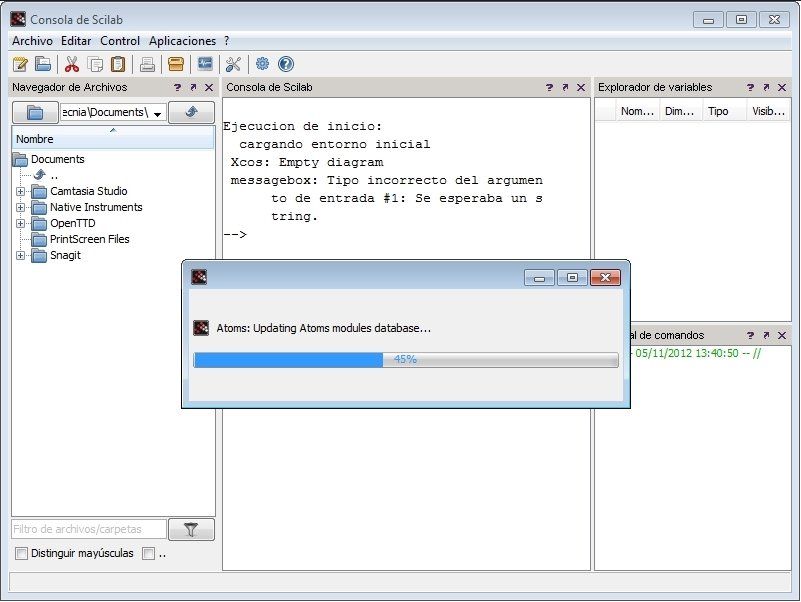Scilab Console Download For Android
The Android SDK is composed of multiple packages that are required for app development. This page lists the most important command line tools that are available, organized by the packages in which they're delivered. Scilab is a high level programming language that allows us to execute all types of mathematic calculations and combine various operations in a script to create a program through them. Polynomial, matrixes, derivatives, integrals, equations or interpolation are some of the operations that can be solved using Scilab.
You can use Android Emulator to create emulations of Android devicesthat run your own custom Android system images. You can also share your customAndroid system images so that other people can run emulations of them. Inaddition, you can add multi-display support to Android Emulatoremulations.
Android Emulator architecture
Android Emulator allows you to run emulations of Android devices on Windows,macOS or Linux machines. The Android Emulator runs the Android operating systemin a virtual machine called an Android Virtual Device (AVD). The AVD containsthe full Android softwarestack, and it runs as if itwere on a physical device. Figure 1 is a diagram of the Android Emulator'shigh-level architecture. For more information about the emulator, seeRun apps on the Android Emulator.
Figure 1. Android Emulator architecture
Building AVD images
Each AVD includes an Android system image, which runs inthat AVD. The AVD Manager includes some system images. And you can build customAVD system images from your source code and create device emulations to run them.
Note: You need toestablish a build environmentbefore building AVD system images.Guts and glory game download free mac. To build and run an AVD system image:
Download the Android source:
If you want to build other Android versions, you can find theirbranch names inthe public Android repository.They map toAndroid Codenames, Tags, and Build Numbers.
Build an AVD system image. This is the same process as building anAndroid device systemimage. For example, to build a x86 32-bit AVD:
If you prefer to build an x86 64-bit AVD, run
lunchfor the 64-bit target:Run the AVD system image in the Android Emulator:
See theCommand-line startup optionsfor more details about running the emulator. Figure 2 shows an example of the Android Emulator running an AVD.
Figure 2. Android Emulator running an AVD
Sharing AVD system images for others to use with Android Studio
Follow these instructions to share your AVD system images with others. They canuse your AVD system images with AndroidStudio to develop and test apps.
Make additional
sdkandsdk_repopackages:This creates two files under
aosp-master/out/host/linux-x86/sdk/sdk_phone_x86:sdk-repo-linux-system-images-eng.[username].ziprepo-sys-img.xml
Host the file
sdk-repo-linux-system-images-eng.[username].zipsomewhere accessible to your users, and get its URL to use as the AVDSystem Image URL.Edit
repo-sys-img.xmlaccordingly:- Update
<sdk:url>to your AVD System Image URL. - Seesdk-sys-img-03.xsdto learn about other updates to the file.
- Update
Host
repo-sys-img.xmlsomewhere accessible to your users, and get itsURL to use as the Custom Update Site URL.
To use a custom AVD image, do the following in the SDK Manager:
Add the Custom Update Site URL as an SDK Update Site.
This adds your custom AVD system image to the System Images page.
Create an AVDby downloading and selecting the custom AVD system image.
Adding Multi-Display support
Android 10enhances Multi-Display (MD)to better support more use cases, such as auto and desktop mode. AndroidEmulator also supports multi-display emulation. So you can create a specificmulti-display environment without setting up the real hardware.
You can add multi-display support to an AVD by making the following changes, orby cherry picking fromthese CLs.
Add multi-display provider to the build by adding these lines to file
build/target/product/sdk_phone_x86.mk:Enable the Multi-Display feature flag by adding this line to file
device/generic/goldfish/data/etc/advancedFeatures.ini:

You can find the latest emulator features and release information fromthe following sources:
Polynomial, matrixes, derivatives, integrals, equations or interpolation are some of the operations that can be solved using Scilab. It supports both normal and scientific calculations.
Like in any other programming language, operations in Scilab are described through the use of variables, operators, functions, flow control, etc. Its strong point is graphic generation in two and three dimensions (it is capable of creating a PostScript file from them).

Notes